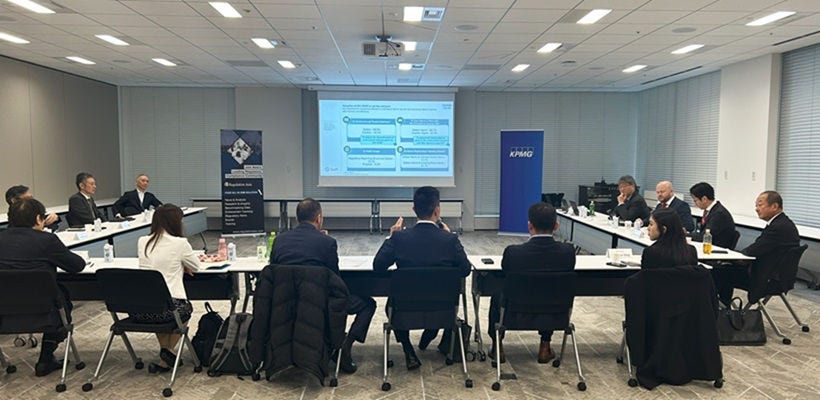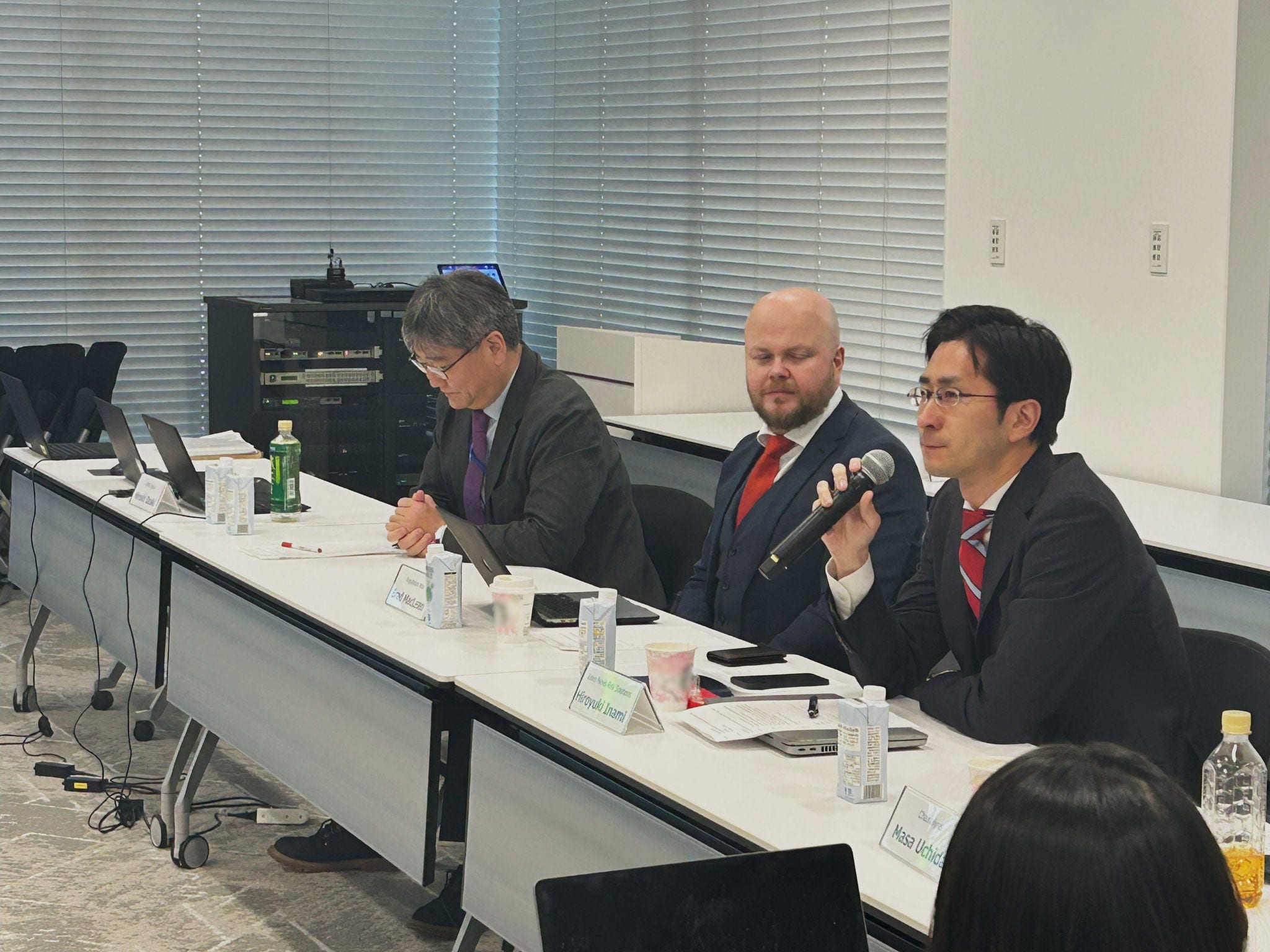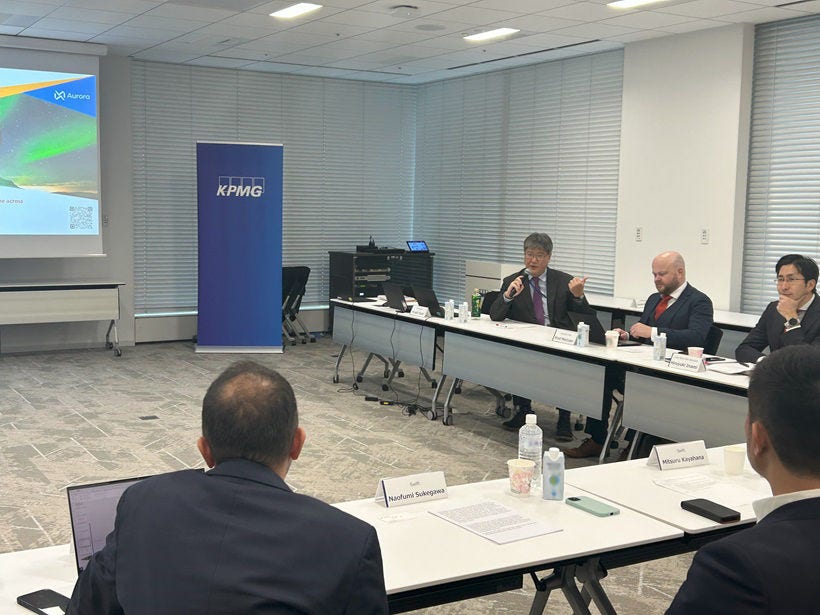At a recent roundtable in Tokyo, participants discussed strategies to fight financial crime in the age of AI and globalisation.

Issues in Anti-Financial Crime
Financial crime doesn’t just damage economies; it erodes trust, undermines security, and threatens the very integrity of financial systems worldwide. As globalisation and technology continue to transform the way we move money, the stakes have never been higher for policymakers and financial institutions (FIs) alike.
FIs in particular are pouring billions into combating financial crime, but the challenges keep multiplying. With complex regulatory requirements, fragmented across jurisdictions, along with fast-pace technological developments and criminals rapidly evolving their tactics, the road ahead is anything but straightforward.
On 6 March 2025, Regulation Asia and KPMG in Japan hosted the roundtable in Tokyo as a side event of Japan Fintech Week 2025, to discuss strategies to combat financial crime amid evolving risks, AI advancements, and increasing globalisation.
The Rising Cost of Compliance
One of the most immediate and visible challenges is the soaring cost of compliance. Regulatory frameworks worldwide are becoming increasingly detailed and intricate, requiring FIs to invest heavily in technology, infrastructure, and skilled personnel. As FIs struggle to meet these growing demands, labour costs alone account for a significant portion of these expenses.
This investment is necessary, but it doesn't come cheap. The integration of advanced analytics and AI offers the promise of more efficient fraud detection, but the upfront costs—building robust data infrastructures, training personnel, and ensuring model transparency—can strain resources.
Speaking at the roundtable, Hiroyuki Inami from LexisNexis Risk Solutions said: “Compliance is expensive—labour costs alone are eating up budgets. But what choice do FIs have? The pressure to meet these obligations isn’t going away anytime soon.”
The pressing question, then, is how FIs can strike a balance between managing the escalating financial burden of compliance and staying competitive in an increasingly crowded market. Moreover, could these rising costs inadvertently create vulnerabilities, drawing the attention of bad actors to specific FIs that may struggle to keep pace with compliance demands?
The roundtable participants expressed the need for regulatory frameworks that are adaptive and responsive to new threats and facilitate collaboration and information sharing, but without stifling innovation or imposing excessive burdens on FIs, allowing them to remain agile in the face of financial crime.

AI and Machine Learning~A Double-Edged Sword~
AI and machine learning (ML) have become indispensable tools in the fight against financial crime. These technologies process vast amounts of real-time data, helping to identify complex patterns that may signal fraud, money laundering, or other illicit activities. However, implementing AI is fraught with challenges that FIs must address.
One persistent concern is explainability—the ability to understand and evaluate how AI models arrive at their decisions. Transparency is not just a regulatory requirement; it is fundamental to building trust among stakeholders. Without clear and explainable models, AI risks becoming a "black box”, undermining confidence and inviting heightened scrutiny.
One roundtable participant commented: “The big challenge here is balancing two things—using AI to fight financial crime while making sure we don’t sacrifice user privacy or transparency. It’s a tightrope walk.”
FIs must confront these issues head-on and ask themselves: Given AI's "unknown unknowns"—the risks and challenges we cannot yet foresee—how can we ensure that these systems are genuinely transparent, ethical, and free from bias?
What mechanisms are in place to detect and address issues that may only surface over time, and how do we guarantee that the safeguards we implement today will remain robust and effective in the face of tomorrow's uncertainties?
The Privacy Paradox
As FIs increasingly rely on data-driven solutions, privacy concerns have become a central issue. Privacy-enhancing technologies (PETs) offer a promising way to protect user privacy while allowing for effective data analysis, but their implementation introduces significant governance and accountability challenges.
According to Beju Shah, Head of Nordics at BIS Innovation Hub, PETs can help FIs comply with privacy regulations, but they can also risk unintended consequences. “The risk of legitimising synthetic IDs remains a significant concern," he said, noting that the ability to create synthetic identities for testing and analysis can inadvertently lead to misuse and abuse if improperly regulated.
Shah said the BIS Innovation Hub’s Project Aurora is exploring how robust governance frameworks and standards can ensure PETs are used responsibly. The aim of the project is to facilitate collaboration and data-sharing across FIs and borders and create a more effective framework for combating financial crime on a global scale, while prioritising user privacy.
Another participant at the roundtable aptly summarised the stakes saying: “If we don’t get the privacy aspect right, we risk losing public trust—and that’s a cost no FI can afford.”
Striking the right balance between leveraging data for financial crime prevention and protecting customer privacy requires robust governance frameworks, and a commitment to transparent and ethical practices. FIs must also consider the "unknown unknowns" of both PETs and AI, preparing for risks and challenges that may only emerge with time.

A Call to Action
The fight against financial crime is an ongoing battle, and the stakes could not be higher. As FIs navigate the challenges of compliance, technology adoption, and international coordination, they must remain vigilant, adaptable, and committed to ethical practices.
The path forward is clear: embrace innovation, foster collaboration, and commit to a governance framework that prioritises transparency and trust. As one roundtable participant put it, “If we’re serious about fighting financial crime, we need to think big, act fast, and work together.”
The journey is far from over, but a more secure and trustworthy financial ecosystem is within reach with the right mix of technology, collaboration, and foresight.
By Hiroshi Ozaki, Executive Advisor at KPMG AZSA LLC, and Bradley Maclean, Co-Founder, Regulation Asia



